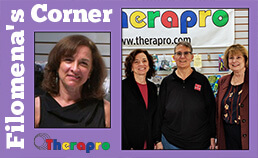
Assistive Technology in Schools was presented by Kristi Voelkerding, BS, COTA/L, ATP, ROH on a brisk February morning at Therapro headquarters with 45 attentive, engaged, interactive, vocal attendees.
Kristi has forged a distinguished career path as an AT specialist who is in demand as a speaker. She has worked for Easter Seals primarily as a consultant mainly in school-based settings since 2000. Her breath of knowledge regarding assistive technology is extensive and current. In a field where technology changes constantly, she is a wonderful resource for therapists, teachers, and families. AOTA conferred upon Kristi a Roster of Honor award in 2007 to recognize her leadership in AOTA and her innovative practices in assistive technology.
Kristi’s seminar spurred audience interaction regarding apps recommended and apps used successfully with various age groups. She discussed using technology as a “bridge” that should be introduced early in school so that students can access learning in ways that are unique to them and their needs. She initiated her talk with discussion about the broad variety of keyboards available that can match a student’s needs. She advocated that the student must find what method of keyboarding is fastest for him/her, be it one finger, one hand, two hands, or even the nose or foot. She suggested creating word lists on the computer to practice learning the geographical area on the keyboard. Kristi cautioned that layering copying (motor task) with thinking about the content of the task (cognitive task) is difficult. She recommended that a speech recognition program be used if the student has difficulty holding the thought while trying to type it. Creating a first draft on the keyboard was recommended rather than writing, and then copying it onto the computer.
Kristi noted that more schools are moving toward using the chromebook because it is more cost effective than an iPad, especially if it’s damaged and needs to be replaced. In addition, work on the chromebook is not lost if the device is damaged. A negative of using the chromebook is that a user cannot be “locked in” to a particular site. User needs must be considered when deciding which device would be best.
Apps are available for all age groups. iTrace is an iPad app for teaching handwriting, spelling, and letter identification. It may be a great place to start with a preschool student. Kristi advocated for using a stylus vs. using a finger for handwriting work, and in this app the student uses a stylus. For students who are moving from high school to college, there is “transition technology” available that promotes the shift from using adult support to depending on technology instead. For older students, she discussed using the Livescribe, a smart pen that facilitates note taking by recording everything you hear, write, and draw. The smartpen records audio and links it to what the student writes. Another note taking app for use with an iPad is Nebo MyScript, which lets you write, draw, quickly edit and structure notes, and convert them into digital text, using a stylus.
Kristi provided a number of resources for PCWindows Programs, Chromebooks/Chrome apps/add-ons/extensions, and Websites/Web-based apps. The resources have grown exponentially in the past few years and continue to swell. We are grateful to Kristi for sharing her expertise and experience navigating this area of practice.
Take a look at some attendees’ positive responses to Kristi’s seminar:
“Kristi was informative & knowledgeable regarding the materials presented. Lots of material I can use on Monday at school.” – Alyson P., Occupational Therapist
“Very informative and interactive. Well presented.” – Jillian N., Occupational Therapist
“Lots of useful info.” – Marisol P., Teacher/Parent
“Very knowledgeable speaker. Very receptive to gearing her talk to audience needs. Lots of info presented.” – Anonymous, Occupational Therapist
“Learned abut some new, exciting, & cutting edge technology.” – Sharon T., Occupational Therapist
Thank you, Kristi!
Filomena Connor, MS, OTR/L
February 23, 2018
